- Home
- Isabel Allende
A Long Petal of the Sea Page 23
A Long Petal of the Sea Read online
Page 23
An extremist left-wing movement sprang up calling for armed struggle, tired of waiting for the revolution to triumph by peaceful means. At the same time, so too did a Fascist one that didn’t believe in civilized compromises either. “If we have to fight, let’s get on with it,” both sides said. In order to escape Jordi’s clinging affection for a few hours, Carme took part in the huge demonstrations that crowded the streets in support of the government, but also the equally big opposition ones. She would leave in her sneakers with a lemon and a handkerchief soaked in vinegar to counteract the tear gas, and return soaked to the skin from the water cannon the police used to try to impose order. “Everything is a mess,” she would say. “It will only take a spark for the whole thing to explode.”
Isidro del Solar’s estate wasn’t expropriated, but was taken over by the peasant farmers. He regarded it as having been lost temporarily, because, as he told everyone, decency and morality would be restored sooner or later, and concentrated on saving his wool export business before the rabble ate his animals. He hired huasos from the south who knew the paths and shortcuts through the Andes, and sent his sheep to Argentine Patagonia, as other ranchers did with their cattle. Also, he transferred his family to Buenos Aires. They left en masse, including the married daughters, their husbands, and the grandchildren with their nannies. Juana Nancucheo stayed behind to look after the Calle Mar del Plata house. Laura had to be dragged along, stupefied with tranquilizers and sweets, after she was promised that in her absence Felipe would make sure there were always fresh flowers on Leonardo’s grave. Felipe was the only one of the family who stayed; he carried on working at his legal practice, although the other two lawyers left to open a branch in Montevideo.
In those days he would often pay a visit to the Dalmaus in their house in the traditional Nuñoa district, where nobody from his own class lived. He dropped in with a couple of bottles of wine and a desire to talk. He no longer felt at ease with his lifelong friends, but couldn’t fit in with his few acquaintances on the Left either. They reproached him about his affected manners copied from the English, as well as the vagueness of his political position. The Club of the Enraged had long ago dissolved. He dedicated himself to acquiring, at knockdown prices, antiquities and works of art from families who were leaving the country in a hurry, until before long he had no room to move about in his house. He began looking for a larger one, taking advantage of the fact that property was well-nigh being given away. He laughed at himself, recalling how in his youth he had criticized the extravagance of his parents’ home. When Roser asked him what he would do with all his trinkets if, as he often said, he decided to leave the country, he replied that he would store them in a warehouse until his return, because Chile wasn’t Russia or Cuba, and the famous Chilean-style revolution wasn’t going to last very long. He seemed so certain of this that Victor suspected his friend was in the know about some fundamental intrigue. Just in case, he never mentioned his games of chess with the president.
Whenever Felipe drank whisky to follow the wine over dinner, his tongue was loosened, and he started railing against life and the world in general. He had become cynical, with little left of his youthful idealism and generosity. He admitted that socialism was the most just system, but in practice it led to a police state or a dictatorship as in Cuba, where anybody who didn’t agree with the regime either escaped to Miami or ended up in prison. His aristocratic nature abhorred the disorder of equality, revolutionary clichés, dogmatic slogans, vulgar manners, bushy beards, and the ugly handicrafts: cane furniture and jute carpets, rope sandals, seed necklaces, crocheted skirts. It was all a huge disaster. “I don’t see why we should dress like beggars,” he maintained. Not to mention what was called popular culture, which had nothing cultural about it. It was a Chilean version of the Soviets’ horrible socialist realism, with their murals of miners raising their fists and Che Guevara portraits, singer-songwriters preaching sermons with their tedious little tunes. “Even instruments like the Mapuche trutruca and the quena of the Quechuas have become fashionable!”
However, when Felipe was with his usual right-wing friends, he would subject them to an equally devastating critique of the recalcitrant, conspiratorial upper classes who were stuck in the past and remained blind and deaf to the people’s demands, only too ready to defend their privileges at the cost of democracy and of their country. They were traitors. In short, nobody could stomach him, and he became increasingly isolated. His bachelor’s solitude weighed heavily on him, and he was full of aches and pains.
Victor, who had been so pleased with the improvements in public health, from the daily glass of milk for every child as a palliative against malnutrition to the building of new hospitals, found he had no antibiotics, anesthetics, needles, syringes, or basic medicines. There was also a shortage of people to care for the sick, because many doctors had left Chile to ride out the feared Soviet tyranny that the opposition propaganda was predicting, and because the School of Medicine had declared a strike, which most of his colleagues joined. He continued working double shifts, falling asleep on his feet, weary to the core, and feeling as though he had lived through the same thing during the Spanish Civil War. Other professional associations, factory owners, and business organizations also imposed a shutdown. When truck drivers refused to work, the long, thin country was left without transport. Fish rotted in the north, vegetables and fruit in the south, while in Santiago there were shortages of essentials. Allende roundly denounced North American intervention in their financing of the truck drivers and right-wing conspiracies. Students added to the chaos, barricading themselves in university lecture halls. When they blockaded the faculty entrance with sandbags, Roser arranged to see her students in the park and gave her theory classes in the open air, under umbrellas if necessary. She took attendance and gave grades as usual, only sad that she couldn’t drag a grand piano out there. People grew accustomed to the sight of the police in riot gear, protest placards and banners, inflammatory posters, the threats and catastrophic warnings in the press, the shouts from one side and the other, everyone against everyone. And yet there was unanimous consensus over the complete nationalization of mining.
“It was about time,” Marcel Dalmau told his grandmother. “Copper is Chile’s paycheck, it’s what sustains the economy.”
“If copper is Chilean, I don’t see why it has to be nationalized.”
“It’s always been in the hands of North American companies, Àvia. The government took it back and refused to indemnify the Americans, because they owe the country billions of dollars in excessive profits and tax evasion.”
“The Americans aren’t going to like that. Take heed of what I’m saying, Marcel, there’s going to be trouble,” Carme told him.
“When the Americans leave the mining industry, we’re going to need more Chilean engineers and geologists. I’m going to be in demand, Àvia.”
“I’m glad. Will they pay you more?”
“I don’t know. Why?”
“So that you can get married, Marcel. If you don’t hurry up, I’m not going to get to know my great-grandchildren. You’re thirty-one, it’s time for you to settle down.”
“I am settled.”
“I can’t see any women in your life. That’s not normal. Have you never been in love? Or are you one of those who…? Well, you know what I mean.”
“How nosy you are, Àvia!”
“This comes from the vice of riding a bicycle. It crushes the testicles and causes impotence and sterility.”
“Aha.”
“I read it in a magazine at the hairdresser’s. And it’s not that you’re bad-looking, Marcel. If you got rid of that beard and cut that mop of hair of yours, you’d look just like Dominguin.”
“Who?”
“The bullfighter, of course. And you’re not stupid either. Wake up a bit. You’re like a Trappist monk.”
Carme hadn’t anticipated
that one consequence of the nationalization would be that the copper corporation gave her grandson a grant to go to the United States. She got it into her head she would never see him again. Marcel left for Colorado, to a city at the foot of the Rocky Mountains founded during the gold rush, to study geology. He took his dismantled bike with him because it was specially made for him, together with his Victor Jara records. “I’ll write to you,” was the last thing Àvia told him in the airport.
Marcel had studied English with the same quiet obstinacy that made him refuse to speak Catalan, and was able to adapt after only a few weeks in Colorado. He arrived at the start of a golden fall, and a couple of months later was shoveling snow. He joined bike enthusiasts training to cross the United States from the Pacific to the Atlantic, and another group that climbed mountains. Victor was never able to go and see him; with all the disturbances, demonstrations, shutdowns, strikes, and overwork, he couldn’t find time to travel. But Roser visited him a couple of times and was able to inform the rest of the family that her son had possibly said more in English in Colorado than he had in Spanish in all his previous life. He had shaved off his beard and wore a short ponytail. Àvia was right, he did look like Dominguin.
Far from his family’s scrutiny, free from the conflicts and injustices taking place in Chile, and in the intellectual oasis of the university, where he spent his time deciphering the secret nature of rocks, for the first time he felt comfortable in his own skin. In Colorado he wasn’t the son of refugees, nobody had heard of the Spanish Civil War, and only a few people could place Chile on a map, much less Catalonia. In this foreign reality and in a different language he made friends, and within a few months was living in a tiny apartment with his first love, a young Jamaican woman who studied literature and wrote for newspapers. On Roser’s second visit, she met the girlfriend and returned to Chile commenting that as well as being beautiful, she was as bubbly and talkative as Marcel was introverted. “Don’t worry, Doña Carme, your grandson is finally wising up. The Jamaican girl is teaching him to dance to her country’s rhythms. If you saw him writhing around to the sound of drums and maracas, you wouldn’t believe it.”
* * *
—
AS SHE FEARED, Àvia never embraced her grandson again, nor did she meet the Jamaican girl or any of his other girlfriends, or the great-grandchildren who would have prolonged the Dalmau lineage. She died in her bed on the morning of her eighty-seventh birthday, when the tent and tables for the party had already been set up behind the house. She had gone to bed with her smoker’s cough as always, but in good health and looking forward to the celebration. Jordi Moline woke to the daylight filtering in through the slats in the shutters. He lay around in bed, waiting for the smell of toast to tell him it was time to get up, put his slippers on, and have breakfast. It took him several minutes to realize that Carme was still alongside him, motionless and cold as marble. Taking her by the hand, he lay there quietly, sobbing gently as he took in the terrible betrayal of her going first and leaving him all alone.
Roser discovered Carme around one o’clock that afternoon, when she appeared at the house with the birthday cake and a car full of balloons to set the tables before the caterer and his assistants arrived. She was surprised by the silence and darkness in the house, the closed shutters and stale air. She called out to her mother-in-law and Jordi from the living room before going to look for them in the kitchen and then venturing into the bedroom. Afterward, as soon as she could react, she picked up the telephone and first dialed Victor’s number at the hospital and then Marcel’s at his hotel in Buenos Aires, where by chance he had been visiting with a group of students. She told them Àvia had died, and Jordi had disappeared.
Carme had said on more than one occasion that if she died in Chile she wished to be buried in Spain, where her husband and son Guillem were laid to rest, but if she died in Spain she wanted to be buried in Chile, to be near the rest of her family. Why? Well just to cause trouble, she would say with a laugh. And yet it wasn’t simply a joke, it was the anguish of divided love, separation, of living and dying far from one’s loved ones.
Marcel was able to fly to Santiago the next day. They kept vigil over the grandmother in the house where she had lived with Jordi Moline for nineteen years. There was no religious ceremony, because the last time Carme had set foot in church was as a little girl, before she fell in love with Marcel Lluis Dalmau. However, without being asked, two Maryknoll priests who lived nearby turned up. In the past, Carme had traded serrano ham and manchego cheese Jordi obtained illegally for cigarettes the priests had been sent from New York. The two improvised a funeral service with a guitar and singing that would have pleased Carme.
The only inconsolable member of the family was her grandson, Marcel, who had enjoyed the closest relationship with Àvia. He drank two glasses of pisco and sat and wept for all he hadn’t managed to say to her, for the lost tenderness he had been ashamed of showing her, for having refused to talk to her in Catalan, for having made fun of her disastrous cooking, for not having answered every single one of her letters. He was the one closest to the heart of that rebellious, bossy grandmother who had written him a daily letter after he left for Colorado until the day before she died. From then on, the only thing that went with Marcel wherever he happened to live was the shoe box tied up with string that contained the three hundred and fifty-nine letters from his Àvia. Quiet and sad, Victor sat down next to Marcel, reflecting that his small family had lost the cornerstone that held it up. Much later that night, he said as much to Roser when they were alone in their bedroom. “You’re the cornerstone that’s always held us up,” Roser told him.
Among the mourners at the wake were neighbors, former colleagues, and students from the school where Carme had taught for years, friends from the days when she accompanied Jordi to the Winnipeg tavern, and friends of Victor and Roser. At eight o’clock that night the police arrived on motorcycles and blocked off the whole street to allow three blue Fiats to enter. One of them contained the president, who had come to offer his condolences to his chess-playing friend.
Victor bought a plot in the cemetery big enough to accommodate not only his mother, but Jordi and possibly his father’s remains, if in the future they succeeded in bringing them from Spain. He realized that from this moment on he belonged definitively to Chile. “Our homeland is where our dead are buried,” Carme always used to insist.
The police meanwhile were searching for Jordi Moline. The old man had no family, and his friends were the same as Carme’s. None of them had seen him. Thinking that due to his slight dementia he might have gotten lost, the Dalmaus put up his photograph on posters in local shops, and left the door to his house unlocked in case he returned. Roser thought he must have left in pajamas and slippers, because it seemed to her all his clothes were still in his wardrobe, but she couldn’t be sure. This was confirmed the following summer, when the level of the Mapocho River dropped and they finally found what was left of the old man caught in some reeds. The only items of clothing recovered were shreds of his pajamas. A whole month went by before he was definitely identified and handed over to the Dalmau family for burial beside Carme.
* * *
—
DESPITE PROBLEMS OF EVERY kind, galloping inflation, and the catastrophic news spread by the press, the Allende government still had popular support. This was demonstrated in the parliamentary elections, when its share of the vote grew unexpectedly, making it plain that the economic crisis and the hate campaign would not be enough to get rid of Allende.
“The right wing is arming itself, Doctor,” Victor was warned by the patient who brought him toilet paper. “I know, because in my factory there are rooms locked with metal bars and padlocks. Nobody can enter.”
“That doesn’t prove anything.”
“Some comrades take turns to be on guard day and night because of possible sabotage. They’ve seen crates being unloaded from trucks
. Since they looked different from the usual loads, they decided to investigate. They’re certain they were full of weapons. There’s going to be a bloodbath here, Doctor, because the youth in the revolutionary movement are armed as well.”
That night Victor commented on this to Allende. They were finishing a game they had postponed for several days. The house, purchased by the government as a presidential residence, was Spanish-style, with arched windows, red tiles, a mosaic with the national coat of arms over the entrance, and two tall palm trees visible from the street. The guards knew Victor, and no one was surprised he should turn up late at night. He and Allende played chess in the living room, where there was always a board set up, surrounded by books and works of art.
Allende was not surprised by what Victor had to say. He was already aware of the situation, but legally it was impossible to raid either that factory or any others where doubtless the same thing was occurring. “Don’t worry, Victor. As long as the armed forces remain loyal to the government, there’s nothing to fear. I trust the commander in chief, he’s an honorable man.” He added that the vociferous left-wing extremists who were demanding a Cuban-style revolution were just as dangerous; those hotheads did as much harm to the government as the right wing.
At the end of that year a mass homage to Pablo Neruda was held in the National Stadium. This would be the poet’s last public appearance. The previous year, he had received the Nobel Prize from the hands of the elderly Swedish monarch. Neruda quit his position as ambassador to France and withdrew to the anarchic house at Isla Negra that he loved so much. He was ill, but continued writing in his small study with the angry sea pounding the rocks outside his window. Over the next few months Victor visited him several times as a friend, and on two occasions as a doctor. Neruda would greet him in his indigenous poncho and beret, affable and as much a gourmand as ever, more than ready to share a sea bass baked in the oven and a bottle of Chilean wine and to talk about life. No longer was he the playful joker who dressed up to entertain his friends and wrote odes to a happy day. Although he was flooded with invitations, prizes, and admiring messages from all over the world, his heart was heavy. He was afraid for Chile.

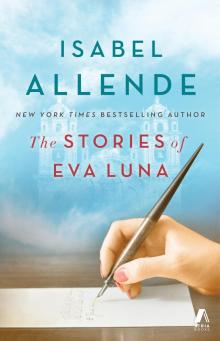 The Stories of Eva Luna
The Stories of Eva Luna The House of the Spirits
The House of the Spirits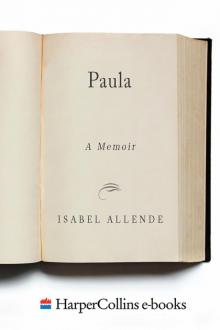 Paula
Paula Ines of My Soul
Ines of My Soul Of Love and Shadows
Of Love and Shadows Kingdom of the Golden Dragon
Kingdom of the Golden Dragon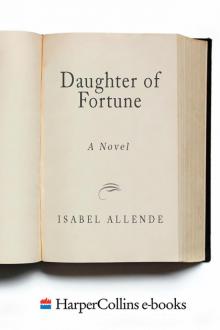 Daughter of Fortune
Daughter of Fortune City of the Beasts
City of the Beasts Maya's Notebook
Maya's Notebook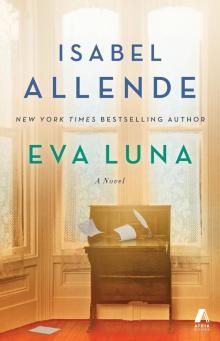 Eva Luna
Eva Luna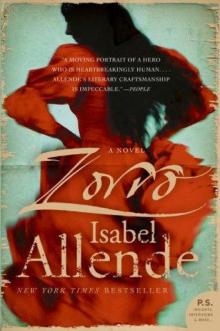 Zorro
Zorro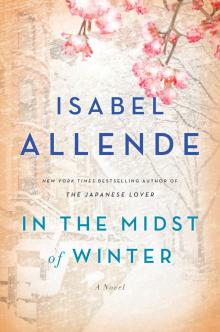 In the Midst of Winter
In the Midst of Winter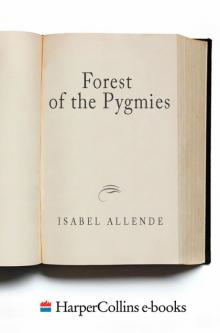 Forest of the Pygmies
Forest of the Pygmies My Invented Country: A Nostalgic Journey Through Chile
My Invented Country: A Nostalgic Journey Through Chile The Japanese Lover
The Japanese Lover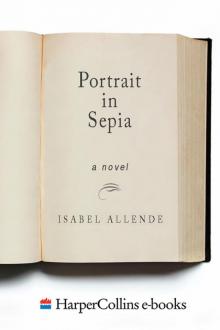 Portrait in Sepia
Portrait in Sepia Island Beneath the Sea
Island Beneath the Sea The Soul of a Woman
The Soul of a Woman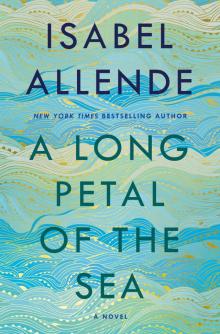 A Long Petal of the Sea
A Long Petal of the Sea Ines of My Soul: A Novel
Ines of My Soul: A Novel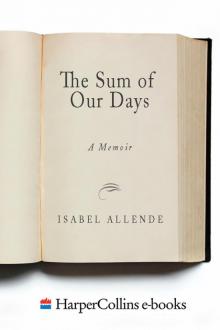 The Sum of Our Days
The Sum of Our Days